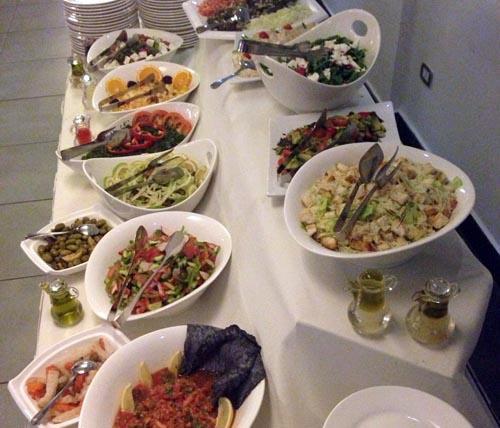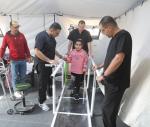You are here
Nutritionists advise against loading up on sweets during eid
By Batool Ghaith - Apr 28,2022 - Last updated at Apr 28,2022

Sweets are a key ingredient to Eid Al Fitr, which marks the end of the holy month of Ramadan. Visiting relatives and friends and exchanges of sweets are indispensable parts of the festive occasion (Photo by Osama Aqarbeh)
AMMAN — Nutritionists encourage people not to overload on sugar and sweets during Eid Al Fitr in order not to “shock” the body after fasting for a month.
Nutritionists told The Jordan Times that it is important to ease into eating several meals after Ramadan is over.
Nutritionist Shahd Yaser said that consuming a large amount of energy-dense foods can lead to indigestion, upset stomach, bloating, weight gain and high blood glucose levels.
“Even though Eid Al Fitr is usually celebrated with big feasts and lots of food and sweets, our bodies are still used to fasting. It is crucial to avoid eating large amounts of different foods at once in order to avoid feeling sick,” Yaser told The Jordan Times on Tuesday.
Yaser advised people to stick to natural foods, such as fruit, vegetables and legumes. “It is tempting to indulge in all kinds of greasy junk food, but it is better to stick to homemade meals and eating small portions, and even if eating out, try to focus on salads and non-fried food,” she continued.
After eid is over, it is important to eat breakfast, lunch and dinner, but it is equally important to make sure to stick to proper nutritional food and avoid processed and sugary foods, Yaser noted.
She also advised people to minimise salt intake as much as they should minimise sugars and sweets, noting that this is important to keep a healthy blood glucose level.
Manal Darwish, another nutritionist and health expert, said that people need to eat the right foods in the right amounts as they return to normal diets.
“I would recommend that anyone who was fasting take it slow,” Darwish said. “It is understandable to want to overdose on all foods after fasting for a whole month, but it is vital to make sure you are not overdoing it,” she said.
Darwish encouraged people to reintroduce foods into their system in “a controlled and disciplined manner”.
“Fasting leads to several changes in your body, so the body needs time to readjust to normal digestion and metabolism,” Darwish told The Jordan Times over the phone. “I recommend that everyone practise the 80/20 rule, which is eating healthy meals 80 per cent of the time and having a serving of your favourite treat with the other 20 per cent.”
Darwish also highlighted the importance of staying hydrated after Ramadan is over, as people tend to forget to drink water due to getting used to fasting to also help them digest faster and better.
“Maintaining sugar levels is crucial during eid days,” Darwish said. “I would recommend that people eat a small portion of salad [vegetables or fruits] or a small sandwich before leaving the house, so when visiting people, they are not very hungry and do not overeat sweets laid in front of them,” she added.
She also said that the best way to avoid overeating sweets is by sharing them with other people.
Mohammad Al Sayyed, nutrition and fitness expert, advised people to always eat slowly.
“By eating slowly, you allow your brain to register the food in your stomach, which prevents over-consumption of food,” he said.
“In order not to spoil the fun and spirit of eid by feeling sick or getting a stomach ache, avoid greasy foods and eat a balanced meal, Sayyed told The Jordan Times on Tuesday. “Even after eid as well, people should make sure to eat small and frequent meals.”
He indicated that meat is a prominent element of eid feasts, which is difficult to digest and has plenty of calories. “People should go for leaner cuts and avoid consuming too much,” Sayyed said. He also recommended going for a 20- to 30-minute walk to help the body digest better and faster.
Sayyed also said that people should go back to their usual sleeping routine after Ramadan is over, as their working hours and workload is increased and the body will feel exhausted without proper sleep.
“Going to bed on time should be made a top priority until it becomes a habit,” he said.
Related Articles
AMMAN — As the holy month of Ramadan approaches, nutritionists and dieticians share tips for an enriching and balanced diet.“The holy month
AMMAN — As Ramadan is under way, dieticians have shared their “practical tips” for a healthy diet during the holy month.“The fasting month b
AMMAN — In light of the start of the holy fasting month of Ramadan, health experts and nutritionists offered advice on healthy fasting habit

















